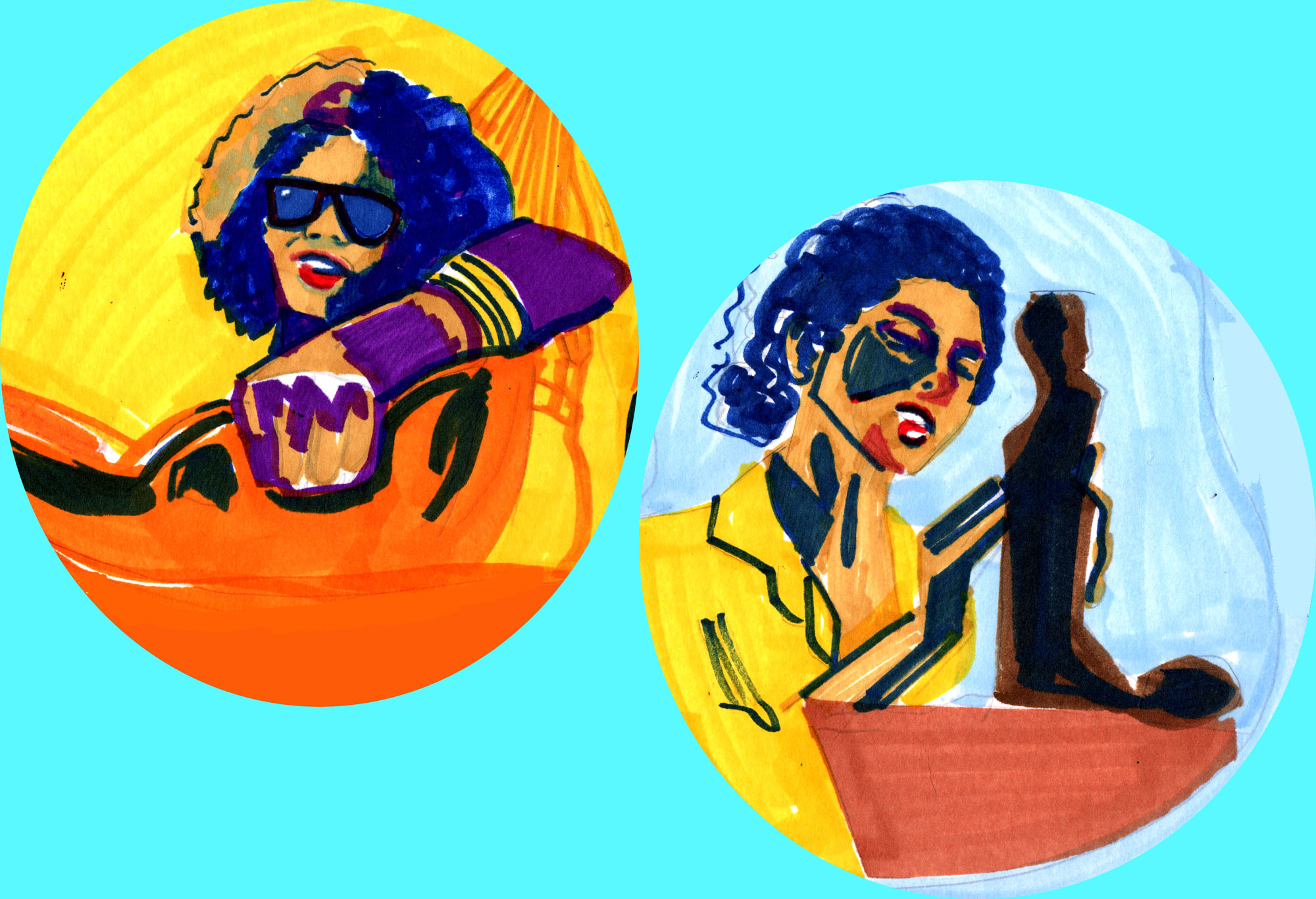
Illustration by Sophie Lucido Johnson.
Unless you’re graduating in a few weeks, you’ve got a summer break to deal with between now and the time you come back.
Summer break has been known to cause an existential crisis in students. What should you do with the time? Should you spend the summer relaxing and doing absolutely nothing or do you pack it full of like, productive, career-making-or-breaking things? There are cases to be made either way, so let’s make them.
DO ABSOLUTELY NOTHING!
by Mary Fons
What’s that icky, burnt smell? That’s the charcoal briquette that is your brainmeats after a year of critiques, final papers, pop quizzes, research projects, studio all-nighters, and dealing with your personal life after all that stuff is done. (It is never done.) That burnt smell is proof that you should — nay, you must — do a whole lotta nothing this summer.
Most “scientific studies” that come out every five seconds are bogus (e.g., “Wine is good for you!”, “Wine is killing you!”) but when it comes to taking vacations and having downtime, the research has been consistent for awhile: If you don’t take a break from time to time, you’re literally doing damage to your health.
The study that gets cited most often to make this case is the Framingham Heart Study (this vacation-positive article in Psychology Today used it, for example.) Researchers followed 12,000 men at risk for heart disease over the course of nine years to figure out who died, when, and the reasons why, maybe. Guess what? The men who took frequent vacations definitely lived longer.
And it’s the same for the ladies. NPR reported in 2009 that University of Radbound researcher Jessica de Bloom found that people on vacation felt healthier. “They were less tense,” reported de Bloom. “And they had a higher level of energy, and they were more satisfied with their life.”
But forget the fancy studies. Let’s be unscientific about this. Just picture the happiest people you know. Chances are, they’re not the ones working 60-hour weeks and packing every “off-hour” with stressful extracurriculars. (“Stressful extracurriculars” are any activities that involve deadlines or children.) The people you know who seem to be sort of generally okay with life are people who take summer vacations, in other words.
There’s value in having time to do nothing but let your mind wander. Zoning out or getting legit bored gets a bad rap, but aimlessly casting about could be the best thing you can do for your art practice, if you apply the logic from this New York Times article.
No matter what other people tell you about the importance packing your summer full of activities, it is the following schedule that is surely the best one for you, your art, and the people around you. (But seriously though: You’re getting a little crunchy, bae.)
11 a.m. — Wake up (ish)
Noonish — Get out of bed (or not)
1 p.m. — Read something (if you want)
2 p.m. — Snack!
3 p.m. — Go somewhere (maybe)
6 p.m. — Text somebody?
8 p.m. — Snack!
Nighttime — Wing it
DO ALL THE THINGS!
by Sophie Lucido Johnson
If you are a student artist, and you have summer vacation away from school, it is not only a good idea to continue your practice, it’s your ethical responsibility. In a letter, John Adams may have put it best:
I must study politics and war, that our sons may have liberty to study mathematics and philosophy. Our sons ought to study mathematics and philosophy, geography, natural history and naval architecture, navigation, commerce and agriculture in order to give their children a right to study painting, poetry, music, architecture, statuary, tapestry and porcelain.”
Not all children in our country have the privilege of studying or practicing art. Economic disparities have made it so that a precious few even have the opportunity to produce creative work. According to some of the most recent statistics, more than 43.1 million people in America live below the poverty line — more than 14 million of them are children. Less than half of Americans between 25 to 34 have a college degree, and 15 percent of youth ages 18 to 24 aren’t in school at all. Having the time and space to be creative is not a given in this country.
This is not to say that you need to look on the bright side of life; or that I’m telling you that you should just be happy with what you’ve been given. This isn’t a “at least you’re not starving in a third world country” kind of an argument. We do not live in a fair or just world. The question I am asking you is, how do you intend to fight?
If you’re going to art school, chances are creativity is a big part of your personal uprising. If art is a creative interpretation of the world — a translation of experience, viewpoints, and needs — then art is always political. The work you make is a huge chunk of the part you play in times of turmoil.
To fail to take advantage of the free time you have to engage in your artistic practice is like running a faucet all day long without drinking any water. It’s not only lazy, it’s irresponsible.
Your practice is only useful to you (and to the rest of the world) if it is an active-tense verb. You must write, paint, sculpt, photograph, march, perform, dance. These are muscles that are built over time, and you have to use them regularly if you want to return to school in the fall ready to hit the ground running. Spend time every day engaging with the work you want to be doing.
The stretches of free time and lack of accountability in summer affords a unique opportunity: to fail. Go paint a mural that your professor told you you weren’t ready for! Write a multi-instrumental orchestra for instruments you’ve never played! In the summer, the only person who can tell you that you can’t do something is yourself. The practice of consistently failing makes it easier, every single time, to get up.
And if you just don’t feel like making art, then don’t. But don’t just sit there, either! Take the opportunity to fill your creative well, so to speak. Go out and have experiences in the world that you can draw from when school is in full swing and don’t have time anymore. Or spend the time you didn’t have in your academic semesters to volunteer somewhere, or join a local activist network.
I don’t want you to feel bad or guilty about your impetus to do nothing. A little break every once in a while is absolutely necessary to keep going! But here’s the thing about seizing the chances you have to live life to its fullest: You will never, not ever, regret it. You really do only get the one life. How incredibly fortunate to be able to spend it making art! Don’t waste your chance.

















